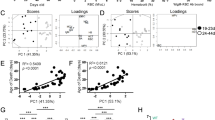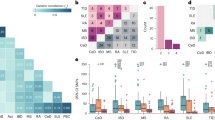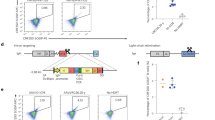Abstract
A STRAIN of mice suffering from hæmolytic anæmia of the autoimmune type has been established by one of us (M. B.). This strain designated NZB/Bl is now in the 52nd generation of brother–sister mating. Serological signs of the disease, such as agglutinating antibodies1 and positive Coombs's tests2, appear in a few animals from the 4th month of life onward, the incidence rising to virtually 100 per cent in animals older than 9 months.
This is a preview of subscription content, access via your institution
Access options
Subscribe to this journal
Receive 51 print issues and online access
$199.00 per year
only $3.90 per issue
Buy this article
- Purchase on SpringerLink
- Instant access to full article PDF
Prices may be subject to local taxes which are calculated during checkout
Similar content being viewed by others
References
Bielschowsky, M., Helyer, B. J., and Howie, J. B., Proc. Univ. Otago Med. Sch., 37, 9 (1959).
Holmes, M. C., Gorrie, J., and Burnet, F. M., Lancet, ii, 638 (1961).
Weisburger, E. K., and Weisburger, J. H., Adv. Cancer Res., 5, 331 (1958).
Bielschowsky, F., and Bielschowsky, M., Ann. Rep. Brit. Cancer Camp., No. 39, ii (in the press).
Author information
Authors and Affiliations
Rights and permissions
About this article
Cite this article
BIELSCHOWSKY, M., BIELSCHOWSKY, F. Reaction of the Reticular Tissue of Mice with Autoimmune Hæmolytic Anæmia to 2-Aminofluorene. Nature 194, 692 (1962). https://doi.org/10.1038/194692a0
Issue date:
DOI: https://doi.org/10.1038/194692a0



